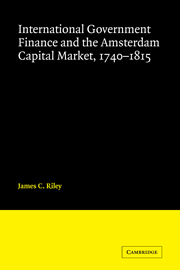Book contents
- Frontmatter
- Contents
- List of tables and charts
- Acknowledgments
- 1 Introduction
- 2 The Amsterdam capital market
- 3 Public credit in the Dutch Republic
- 4 Supply and demand patterns
- 5 International government finance
- 6 The debtor states: I
- 7 The debtor states: II
- 8 The collapse of solvency
- 9 Economic consequences of lending to foreign governments
- Abbreviations
- Notes
- List of sources and works cited
- Index
4 - Supply and demand patterns
Published online by Cambridge University Press: 04 August 2010
- Frontmatter
- Contents
- List of tables and charts
- Acknowledgments
- 1 Introduction
- 2 The Amsterdam capital market
- 3 Public credit in the Dutch Republic
- 4 Supply and demand patterns
- 5 International government finance
- 6 The debtor states: I
- 7 The debtor states: II
- 8 The collapse of solvency
- 9 Economic consequences of lending to foreign governments
- Abbreviations
- Notes
- List of sources and works cited
- Index
Summary
The period of British domination
Dutch foreign lending shifted orientation around 1780 when the British public debt, which had been dominant, ceased to attract the customary volume of new wartime investment. The first indication of that shift was a reduced rate of investment in British loans during the War of the American Revolution in comparison with earlier wartime experience. During the Fourth Anglo-Dutch War rentiers by and large suspended new lending to Britain, dispersing their investments among a number of clients. In the following decade British liabilities in the Republic grew slowly or not at all in sterling values, whereas loans to other foreign governments increased rapidly and came to surpass the British total (Table 4-1).
Throughout the period from about 1720 to Dutch entry into the French Revolutionary wars, credit demand from domestic governments remained less than demand from all foreign borrowers taken collectively. The balance owed by Dutch governments continued to exceed foreign assets, but to a diminishing degree (Chart 4-1), and domestic governments did not, except in the latter 1780s and early 1790s, compete with foreign borrowers. Chart 4-2 portrays foreign lending over a longer period and illustrates its concentration in the second half of the century. Although the volume and velocity of Dutch capital exports grew after 1740, practices and usages developed in the preceding half century remained influential.
- Type
- Chapter
- Information
- Publisher: Cambridge University PressPrint publication year: 1980



